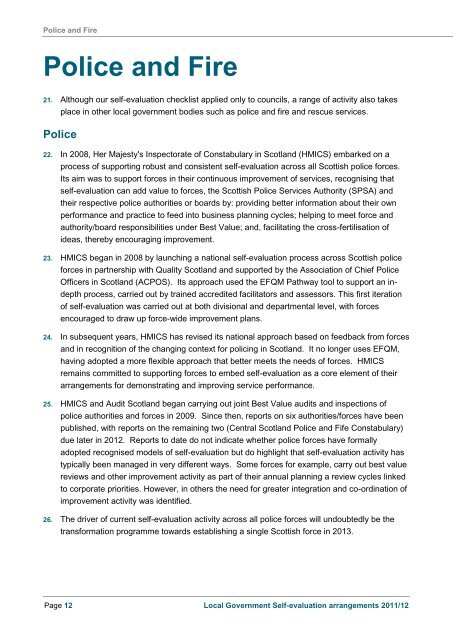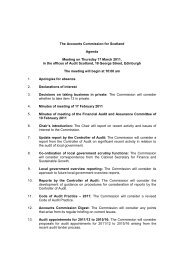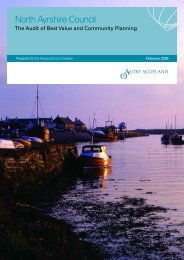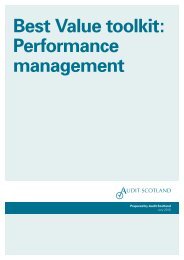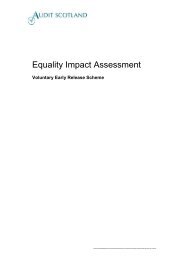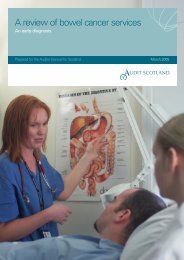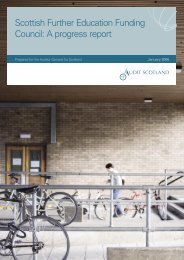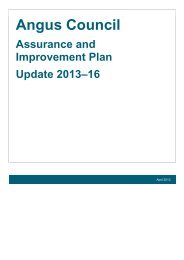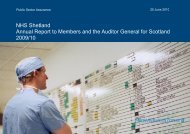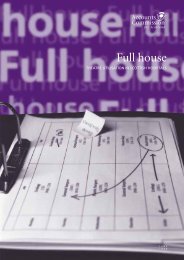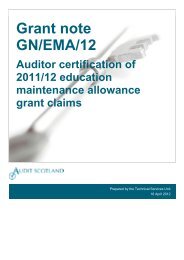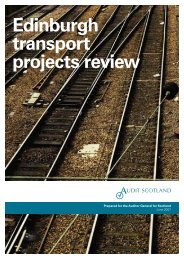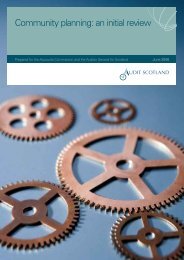Local Government self-evaluation arrangements ... - Audit Scotland
Local Government self-evaluation arrangements ... - Audit Scotland
Local Government self-evaluation arrangements ... - Audit Scotland
Create successful ePaper yourself
Turn your PDF publications into a flip-book with our unique Google optimized e-Paper software.
Police and FirePolice and Fire21. Although our <strong>self</strong>-<strong>evaluation</strong> checklist applied only to councils, a range of activity also takesplace in other local government bodies such as police and fire and rescue services.Police22. In 2008, Her Majesty's Inspectorate of Constabulary in <strong>Scotland</strong> (HMICS) embarked on aprocess of supporting robust and consistent <strong>self</strong>-<strong>evaluation</strong> across all Scottish police forces.Its aim was to support forces in their continuous improvement of services, recognising that<strong>self</strong>-<strong>evaluation</strong> can add value to forces, the Scottish Police Services Authority (SPSA) andtheir respective police authorities or boards by: providing better information about their ownperformance and practice to feed into business planning cycles; helping to meet force andauthority/board responsibilities under Best Value; and, facilitating the cross-fertilisation ofideas, thereby encouraging improvement.23. HMICS began in 2008 by launching a national <strong>self</strong>-<strong>evaluation</strong> process across Scottish policeforces in partnership with Quality <strong>Scotland</strong> and supported by the Association of Chief PoliceOfficers in <strong>Scotland</strong> (ACPOS). Its approach used the EFQM Pathway tool to support an indepthprocess, carried out by trained accredited facilitators and assessors. This first iterationof <strong>self</strong>-<strong>evaluation</strong> was carried out at both divisional and departmental level, with forcesencouraged to draw up force-wide improvement plans.24. In subsequent years, HMICS has revised its national approach based on feedback from forcesand in recognition of the changing context for policing in <strong>Scotland</strong>. It no longer uses EFQM,having adopted a more flexible approach that better meets the needs of forces. HMICSremains committed to supporting forces to embed <strong>self</strong>-<strong>evaluation</strong> as a core element of their<strong>arrangements</strong> for demonstrating and improving service performance.25. HMICS and <strong>Audit</strong> <strong>Scotland</strong> began carrying out joint Best Value audits and inspections ofpolice authorities and forces in 2009. Since then, reports on six authorities/forces have beenpublished, with reports on the remaining two (Central <strong>Scotland</strong> Police and Fife Constabulary)due later in 2012. Reports to date do not indicate whether police forces have formallyadopted recognised models of <strong>self</strong>-<strong>evaluation</strong> but do highlight that <strong>self</strong>-<strong>evaluation</strong> activity hastypically been managed in very different ways. Some forces for example, carry out best valuereviews and other improvement activity as part of their annual planning a review cycles linkedto corporate priorities. However, in others the need for greater integration and co-ordination ofimprovement activity was identified.26. The driver of current <strong>self</strong>-<strong>evaluation</strong> activity across all police forces will undoubtedly be thetransformation programme towards establishing a single Scottish force in 2013.Page 12 <strong>Local</strong> <strong>Government</strong> Self-<strong>evaluation</strong> <strong>arrangements</strong> 2011/12


